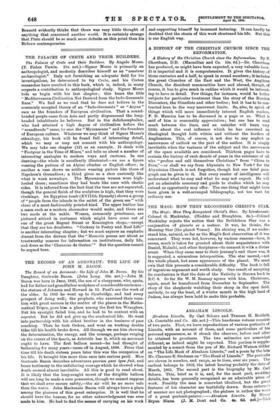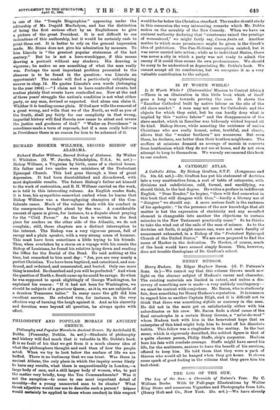ABRAHAM LINCOLN.
Abraham Lincoln. By Carl Schurz and Truman II. Bartlett. (A. Constable and Co. 42s. net.)—This handsome volume consists of two parts. First, we have reproductions of various portraits of Lincoln, with an account of them, and some particulars of his personal appearance, as it struck the observer, before and after he attained to greatness. The two estimates are somewhat different, as indeed might be expected. This portion is supple- mented by a sonnet from the pen of Mr. Richard Watson Gilder on " The.Life Mask of Abraham Lincoln," and a poem by the late Mr. Clarence E. Stedman on "The Hand of Lincoln." The portraits are eleven in number, and range, as to time, over six years. The earliest belongs to 1859, the latest bearing probably the date of March, 1865. The second part is the biography by Mr. Carl Schurz. This, brief as it is, and, for the most part, avoiding details, has been generally recognised as an admirable piece of
• work. Possibly the man is somewhat idealised, but the great features of his character are truthfully drawn. Some externals of manner are not photographed ; the picture is rather the work of a great portrait-painter.—Abrahant Lincoln. By Henry Bryan Binns. (J. M. Dent and CO. 4e. fkl. net.)—Th:3 is one of the "Temple Biographies" appearing under the editorship of Mr. Dugald Mazfadyen, and has the distinction of being the first serious effort by an Englishman to give a picture of the great President. It is not difficult to see indications of this authorship, but it would be certainly rash to point them out. It is better to rely on the general impression made. Mr. Binns does not give his admiration by measure. To him Lincoln is "the greatest popular statesman of the last century." But he is not a hero-worshipper, if this means drawing a portrait without any shadows. His drawing is vigorous ; he makes us see something of what the man really was. Perhaps the most important problem presented to the observer is to be found in the question : was Lincoln an opportunist? The reader will find a particularly enlightening answer in chap. 12. He quotes Lincoln's own words (belonging to the year 1864) :—"I claim not to have controlled events, but confess plainly that events have controlled me. Now at the end of three years' struggle the nation's condition is not what either party, or any man, devised or expected. God alone can claim it. Whither it is tending seems plain. If God now wills the removal of a great wrong, and wills that we of the North, as well as you of the South, shall pay fairly for our complicity in that wrong, impartial history will find therein new cause to attest and revere the justice and goodness of God." "Waiter on Providence" is sometimes made a term of reproach, but if a man really believes in Providence there is no reason for him to be ashamed of it.























































 Previous page
Previous page